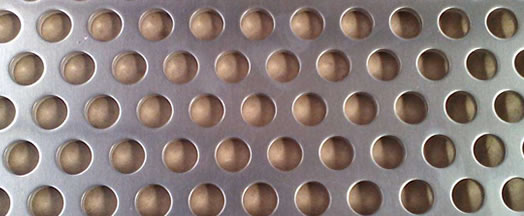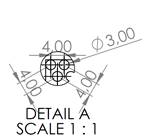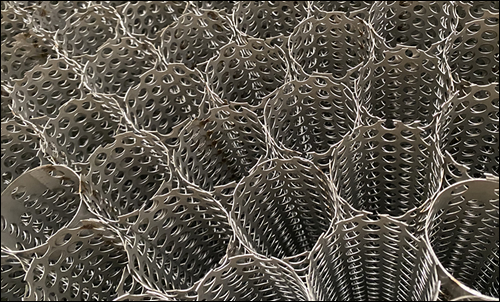Perforated Metal Styles

- Stainless Steel Staggered Sheet in Coil
- Diamond Hole Perforated Metal Panels
- Embossed Sheet Metal
- Slotted Hole Perforated Sheet
- Perforated Noise Barrier Panels
- Punched Slotted Tubes
- Perforated Acoustic Screen Panels
- Perforated Metal Sunshade Screen
- Perforated Metal Disc Filters
- Perforated Ceiling Panels
- Perforated Diffusers
- Perforated Ducting
- Perforated Louvers
- Checker Plate
- Round Hole Perforated Sheet
- Square Hole Perforated Sheet
- Semi-Circular Hole Metal Sheet
- Triangle Opening Metal Sheet
- Decorative Opening Metal Sheet
Perforated Materials:
- Perforated Sheet in Aluminum Powder Coated Black
- Perforated Metal Plates for Tubes
- Perforated Stainless Steel
- SUS 304 Punched Plate
- Aluminum Perforated Sheet
- Perforated Copper Sheet
- Mild Steel Perforated Metal
Perforated Metal Products
- Perforated Stainless Steel Sheets for Steam Strainers
- Perforated Stainless Steel Sleeves
- Dimple Perforated Sheet Steel Grating
- Stainless Steel Perforated Strainer Basket
- Perforated Stainless Steel Air Curtain Screen
- Perforated Screen Sheet in Stainless Steel
- Perforated Windproof Nets
- Perforated Vent Grille
- Polisher Screen
- Perforated Metal Grader Screen
- Perforated Stainless Steel Milling Screen
- Perforated Angle Bead
- Perforated Plate Sieves
- Slotted Filter Sheet
- Perforated Metal Coils
- Perforated Sheets
- Perforated Panels
- Perforated Metal Screen
- Perforated Steel Tube
- Perforated Filters
- Perforated Grilles
- Speaker Grille
- Perforated SS Tube
- Aluminum Perforated Strips
- Balustrade Panels
- Perforated Panel Railings
- Fire Escape Staircase
- Perforated Rack Panels
- Perforated Architecture Mesh
- Perforated Metal Security Screen
- Perforated Cable Tray
- Perforated Channel Cable Tray
- Checkered Tread Plate
- Embossed Tread Plate
- Aluminum Tread Plate
- Non-slip Stair Tread
- Slotted Liner
- Bridge Slotted Screen Pipe
- Dimple Perforated Plate
- Perforated Floor Plate
- Slotted SS316 Perforated Sheet
- Slotted Aluminum Perforated Sheet
- Ni Hard Perforated Floor Plate
- Diamond Perforated Grip Grating
- Hexagonal Perforated Mesh
Technical Terms:
- Perforated Metal Opening Patterns
- Applications of Perforated Sheet
- Materials Applied for Perforated Metal
- Benefits of Perforated Metal
- Calculation of Sheet Metal Weight
- Open Area Calculation
- Perforated Metal Definition
- Perforated Metal Features
- Terminology of Perforated Metal
Other Sheet Metals
Processing Machines

Perforated Steel Tube for Hydraulic Filters and Exhaust Pipe - Perforated Pipe in Carbon Steel Galvanized and Stainless Steel
Perforated Tubes for Hydraulic Filters
Material: Zinc plated carbon steel
Outer diameter x Inner diameter x thickness
20.7x15.7x2.5 mm
31.1x26.1x2.5 mm
33.8x28.8x2.5 mm
35.0x30.0x2.5 mm
58.0x56.0x3.0 mm
66.7x60.7x3.0 mm
Bending Perforated Steel Tube
21mm tube
Wall thickness: 2mm
Perforated with 4mm and 6mm holes.
Pipe length 340mm
Material: Steel
Used exposed to heat and oil
100mm OD Perforated Steel Tube
100mm OD perforated steel tubing
Used as shielding around 1-3/4" exhaust pipe that runs at 1000F.
The perforated tubing connects to a piece of 4" ID flexible exhaust hose.
Perforations allow for air to be drawn in the flexible hose to cool the inner pipe. This type of perforations is rigid and allows air flow.
Length varies from 9-12" lengths.

Perforated tubes for making high performance exhaust systems for autos.
OD 30 x Thickness 1 mm x Length 6 meter
Perforation type: hole size 3mm, triangler stitch 4mm
Carbon Steel Perforated Tube

Carbon steel perforated tubing is usually hot dipped galvanized to enhance its corrosion resistance property.
Perforated Stainless Steel Pipe is corrosion resistant, rust resistant, recycled, ideal for automotive exhaust applications.
Perforated steel tubes are manufactured with round, square, slot holes in straight or staggered designs.
Materials for Perforated Steel Tubes
Perforated Tube is a kind of Welded Steel Pipe made of mild steel or 409, 439, 304, 316 Stainless Steel perforated materials.
Choosing the proper steel materials according to the properties:
Stainless steel is the most corrosion resisting material, while its alloys vary specifically to suit different work environment.
Carbon Steel is the most corrosive and therefore, the least expensive of the three most commonly perforated metals. Produced into coil form by roller leveling to a desired thickness either once while the steel is still hot or again after it has cooled, each of the Carbon Steel types listed below are referred to as either Hot Rolled or Cold Rolled (ex. Cold Rolled Commercial Steel). The difference in processes result in products that differ in terms of cost, quality, and mechanical properties. In short, Hot Rolled is typically less expensive and produced in thicker gauges 7-16, whereas, Cold Rolled provides tighter tolerances, better surface finishes, and while it can be produced in practically any gauge, it is most readily available in thinner gauges 14-28.
Because carbon steel is susceptible to corrosion, it is typically used in either unexposed applications or protected with a coating. Coatings such as paint and powder are applied after perforating and completely protect the material. Zinc based coated metals (i.e. Galvanized, Galvannealed, etc.) on the other hand, are produced and supplied as such from the mill and may not completely protect the material where its carbon core is exposed during the perforating process.
Commonly Perforated Carbon Steel Types
Commercial Steel (HR, CR, GALV) A low cost steel that has good drawing, forming, and welding qualities, moderate strength, but is subject to strains, fluting, and breaks due to aging. To reduce the affects caused by aging, Drawing Steel is recommended.
Drawing Steel (HR, CR)
A steel with a greater degree of ductility and uniformity of properties than Commercial Steel providing improved performance during manufacturing. This type is recommended for use when stretcher strains or fluting during fabrication are objectionable and/or consistency of performance is important.
Forming Steel (GALV)
A steel with lower strength and higher elongation than Commercial Steel. Recommended when stresses from forming either crack or weaken Commercial Steel.
| Hot Rolled Steel (Pickled and Oiled)Cold Rolled Steel Electro Galv. Steel | Hot Dipped Galvanized Steel† Aluminized Steel‡ |
||||||||||
|---|---|---|---|---|---|---|---|---|---|---|---|
| Gauge | Mean of Gauge | Min. of Gauge | Max. of Gauge | Min. of Gauge | Max. of Gauge | Lbs. per Sq. Ft. | Mean of Gauge | Min. of Gauge | Max. of Guage | Lbs. per Sq. Ft.† | Lbs. per Sq. Ft.‡ |
| 7 | .1793 | .1713 | .1873 | .1713 | .1873 | 7.500 | - | - | - | - | - |
| 8 | .1644 | .1564 | .1724 | 1564 | .1724 | 6.875 | .1681 | .1591 | .1771 | 7.031 | 6.934 |
| 9 | .1495 | .1415 | .1575 | .1415 | .1575 | 6.250 | .1532 | .1442 | .1622 | 6.406 | 6.319 |
| 10 | .1345 | .1265 | .1425 | .1285 | .1405 | 5.625 | .1382 | .1292 | .1472 | 5.781 | 5.701 |
| 11 | .1196 | .1116 | .1276 | .1136 | .1256 | 5.000 | .1233 | .1143 | .1323 | 5.156 | 5.086 |
| 12 | .1046 | .0966 | .1126 | .0986 | .1106 | 4.375 | .1084 | .0994 | .1174 | 4.531 | 4.471 |
| 13 | .0897 | .0827 | .0967 | .0847 | .0947 | 3.750 | .0934 | .0854 | .1014 | 3.906 | 3.853 |
| 14 | .0747 | .0677 | .0817 | .0697 | .0797 | 3.125 | .0785 | .0705 | .0865 | 3.281 | 3.238 |
| 15 | .0673 | .0613 | .0733 | .0623 | .0723 | 2.813 | .0710 | .0650 | .0770 | 2.969 | 2.929 |
| 16 | .0598 | .0538 | .0658 | .0548 | .0648 | 2.500 | .0635 | .0575 | .0695 | 2.656 | 2.613 |
| 17 | .0538 | .0478 | .0598 | .0498 | .0578 | 2.250 | .0575 | .0525 | .0625 | 2.406 | 2.363 |
| 18 | .0478 | .0428 | .0528 | .0438 | .0518 | 2.000 | .0516 | .0466 | .0566 | 2.156 | 2.113 |
| 19 | .0418 | - | - | .0378 | .0458 | 1.750 | .0456 | .0406 | .0506 | 1.906 | 1.863 |
| 20 | .0359 | - | - | .0329 | .0389 | 1.500 | .0396 | .0356 | .0436 | 1.656 | 1.613 |
| 21 | .0329 | - | - | .0299 | .0359 | 1.375 | .0366 | .0326 | .0406 | 1.531 | 1.488 |
| 22 | .0299 | - | - | .0269 | .0329 | 1.250 | .0336 | .0296 | .0376 | 1.406 | 1.363 |
| 23 | .0269 | - | - | .0239 | .0299 | 1.125 | .0306 | .0266 | .0346 | 1.281 | 1.262 |
| 24 | .0239 | - | - | .0209 | .0269 | 1.000 | .0276 | .0236 | .0316 | 1.156 | 1.113 |
| 25 | .0209 | - | - | .0179 | .0239 | .875 | .0247 | .0207 | .0287 | 1.031 | 1.019 |
| 26 | .0179 | .- | - | .0159 | .0199 | .750 | .0217 | .0187 | .0247 | .906 | .863 |
| 27 | .0164 | - | - | .0144 | .0184 | .688 | .0202 | .0172 | .0232 | .844 | .833 |
| 28 | .0149 | - | - | .0129 | .0169 | .625 | .0187 | .0157 | .0217 | .781 | .771 |
| 29 | - | - | - | - | - | - | .0172 | .0142 | .0202 | .719 | .709 |
| 30 | - | - | - | - | - | - | .0157 | .0127 | .0187 | .656 | .648 |